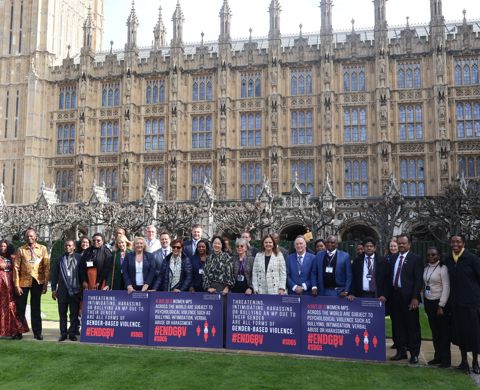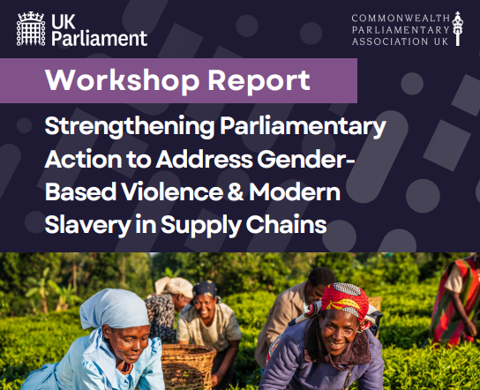How to Strengthen Legislation with Baroness Nicky Morgan, Part 1: Building Credibility, Leveraging Influence and Depoliticising Amendments
Published 28 August 2024
By Jack Manners, CPA UK

Ahead of its upcoming Commonwealth-wide legislative strengthening seminar on modern slavery in supply chains and gender-based violence, due to be held in Westminster in the Autumn, CPA UK sat down with Baroness Nicky Morgan to reflect upon her experiences as someone who has legislated and influenced legislation in both Houses of Parliament.
As a former Secretary of State, legislation has quite literally been passed under Baroness Morgan’s name. During her time as a backbencher in the Commons and more recently as a Peer in the House of Lords, Baroness Morgan has been prolific and effective in campaigning for changes to legislation, in particular the Online Safety Act.
In the first of a new three-part series ‘How to Strengthen Legislation’, Baroness Morgan of Cotes discusses how a parliamentarian can build subject-based credibility to open ministerial doors and influence legislation, leveraging both their silence and the possibility of amendments.
Building credibility
Reflecting on her role as a legislator for 14 years, Baroness Morgan offers a core insight which has remained relevant throughout her career: for the parliamentarian seeking to influence legislation, building subject-based credibility is the key to unlocking ministerial doors. “As a parliamentarian, you are there to listen to those outside Westminster, to the public, to the electorate and the issues they care about… You can build up a credible voice on a particular issue that you deeply care and know about”.
“Then, when a relevant piece of legislation or opportunity arises in Parliament, you’ve got that experience, you’ve thought about how you would change the law – if you had the opportunity.”
And when such opportunities do arise, Baroness Morgan advises parliamentarians to be bold “Say to Ministers ‘I understand you're going to propose a bill on this issue. Look, I've been working on it. Can I come and see you about something?’”
Likewise, Morgan says that credibility may well come from “expertise”. “We have our unelected second chamber; part of the reason that people are there is because they have their own expertise from jobs they have done or are doing and can help make the law better, stronger, more likely to be enforced - more likely to work ultimately.”
Influencing Ministers
Although Morgan does admit that not every request for a meeting will be answered – “much depends on the minister's reaction”. To overcome this hurdle, she advises using the “close physical proximity” possible in parliament to your advantage, adding “You're liable to bump into relevant ministers at both ends [of Parliament]” – a coded revelation perhaps from someone who’s been on both the front and back benches that replying to emails is easy to delay but face-to-face encounters are harder to avoid.
Parliamentarians may doubt that ministerial meetings are so simply won but Morgan explains the rationale from the perspective of a Secretary of State and reiterates that such doors remain open exclusively for parliamentarians who have established a “credible voice” on the issue.
It would be a matter of “politic” for the Secretary of State to engage with “groups which have campaigned on the particular issue or interested in particular elements of the bill” as well as “individuals who've been very vocal”.
Morgan says that this will often occur before legislation is even published; more generally, she stresses the benefit of beginning discussions at the ‘drafted but not yet published stage’ as a crucial moment to influence legislation.
Morgan says that by “opening the policy [through such meetings], ministers or secretaries of state are looking for input. But also there's a moment, when obviously the legislation is drafted but not published, where you want to test out the ideas or, perhaps, even share some of the drafting with those who you know are going to be interested, who are going to be very vocal and comment on these things in order to find out what the objections are going to be, basically”.
Furthermore, if the Secretary of State expects that the legislation is “not going to be well received” then a meeting provides some cover because although opponents can say “’ I don't think the Secretary of State has listened, I don't think she's gone far enough’… the one thing they can't say is that we haven't had a discussion”.
Leveraging Influence & Tabling Amendments
However, for the parliamentarian seeking to influence legislation, the purpose of these meetings is to leverage the silence of that “credible voice” and the potential to put an amendment down.
Morgan summarises the position: “I’ve been shown draft legislation, the bill is silent about [this issue I care about], why does it not have a provision? You know, I’m going to put an amendment down for debate, if you [the government] don’t come up with some wording yourself.”
However, Morgan points out that “tactics” play an important role too, and a more constructive approach that leverages the possibility of an amendment – “showing the government the drafted amendment and saying ‘I’ve got support from a number of Peers across the House of Lords or number of backbench MPs so let’s have a meeting and I’ll show you what I’m going to put down and why’” – can be just as effective in terms of changing legislation, particularly as it doesn’t require a majority vote in favour to succeed.
Though, the more subtle takeaway from Morgan’s positioning here is to not enter such conversations without a reasonably well estimated number of supportive colleagues.
Meanwhile, adding to the reasons why it’s so important to build up a credible parliamentary voice, “The Whips are on the lookout for potential amendments to bills which the government could lose a vote on. And so, when the relevant piece of legislation comes, [the whips and] ministers will already have a sense that this particular member who’s been calling for action on this particular point for a number of years is going to be interested in this bill.”
“They might seek out a meeting” to pre-empt that person laying down or backing an amendment, creating an opportunity for the parliamentarian to once again leverage their position and strengthen legislation.
In any case, Morgan says that once an amendment has been drafted “it will usually trigger a meeting because governments don’t like losing amendments and they’d like to know what’s going on.”
“I think sometimes there’s a temptation, sometimes amongst officials, to say ‘this will never get support, or this won't work’ and we're just going to tell them why it won't work. But in my experience, actually, the more that MPs and Peers are told something won't work, the more determined they become because they know that there's an issue.”
Forging Alliances & Depoliticising Issues
When it comes to actually winning an amendment, Morgan says it is crucial to “build alliances” and “start talking” with other members of parliament, striving always for “cross-party support”. “Particularly, in the UK House of Lords, it is impossible, I think, to get an amendment made to a bill if you haven't got cross-party support.
“If you propose something which attracts support from across the House, then you know you've hit upon an issue and the government knows you've hit upon an issue which probably needs to be looked at again, even if they would much rather not.”
Building cross-party support touches upon a larger point that Morgan makes around depoliticising amendments to increase their odds of passing. In particular, she suggests that grounding your proposals from a position of local representation makes them appear less partisan “I think it's important to make it clear why you're proposing an amendment in the sense that it's coming from a place of representation of the public.”
On being a constituency representative, Morgan says that many “ideas for legislation will come from “constituency experience” which offers a sounding board to “test out ideas” and see how far local support can carry you. For instance, “there might be a local petition, or you might have launched some kind of local campaign to test support [for your proposals] and then take it to Parliament and see if you can get the change”.
“The way that people see the issue elsewhere in the country may be different, but it might well be the same actually”.
First elected to the Commons in 2010, Baroness Nicky Morgan quickly found her way to the cabinet table, notably serving in government as Secretary of State for Education and Minister for Women and Equalities from 2014 to 2016, and as Secretary of State for Digital, Culture, Media and Sport from 2019 to 2020. She ascended to the House of Lords in 2020, the UK parliament’s upper house which is responsible for scrutinising and reviewing legislation.
For more information on the UK Branch of the Commonwealth Parliamentary Association and the Legislative Strengthening Seminar to be held in Westminster in Autumn 2024 see: https://www.uk-cpa.org/news-and-views/commonwealth-parliamentarians-continue-mission-to-eliminate-forced-labour-and-violence-against-women-and-girls





